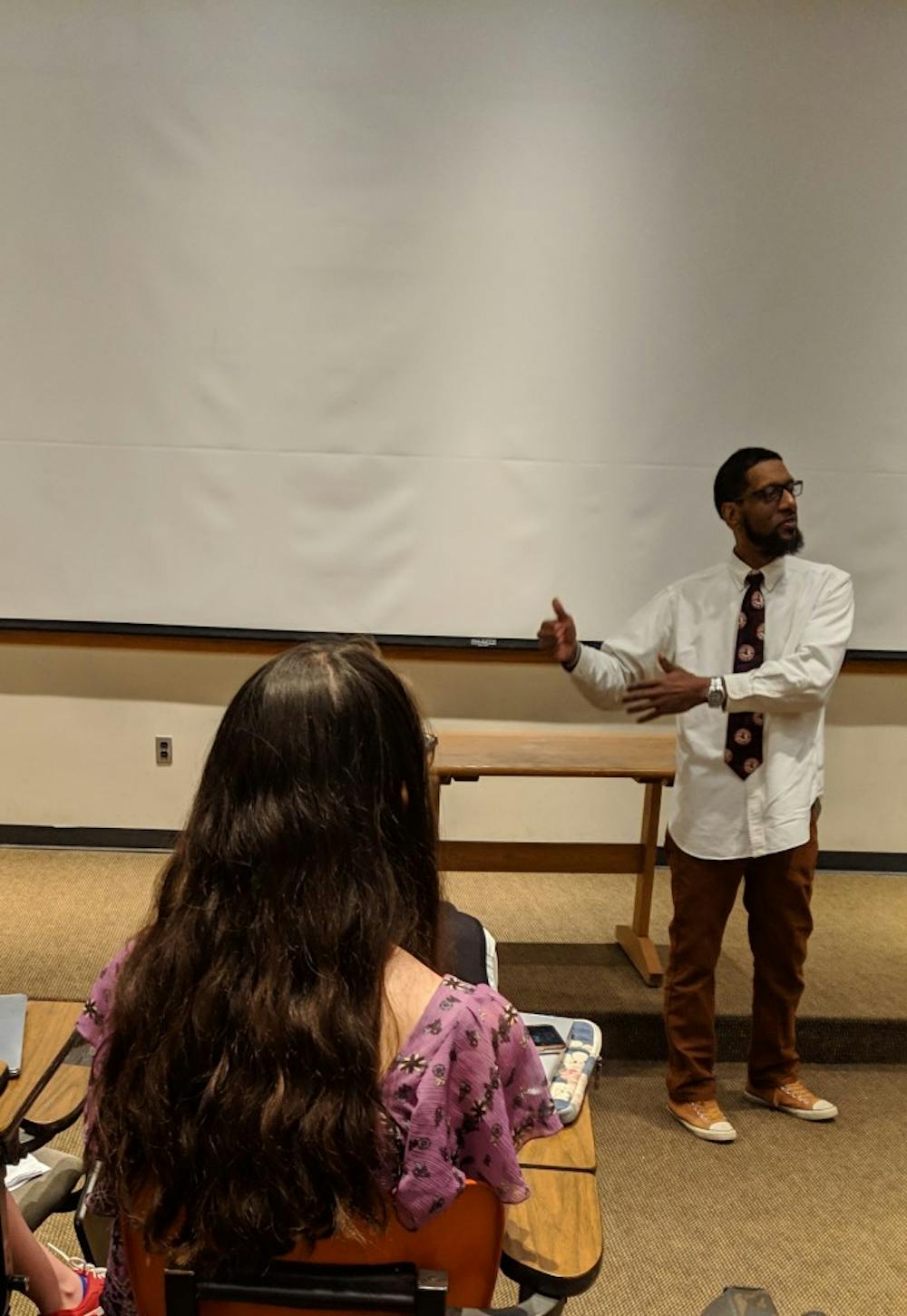George Mitchell from Neighborhoods United, an organization of community associations in Baltimore, and Ray Kelly from Communities United, a group that helps working families obtain socioeconomic and environmental justice, gave a guest lecture during a class titled “Health and Wellbeing in Baltimore: A Public Health Perspective.” Mitchell and Kelly explored the role that students can play in their community.
Philip J. Leaf is the primary instructor of the class. Different speakers such as Mitchell and Kelly come in each week to speak about public health issues Baltimore faces. Guest speakers also discuss how students can interact with the community to improve the city.
Mitchell, a veteran and a graduate of Morgan State University and Saint Leo University, has a background in leadership and management.
When Mitchell moved back to Baltimore after working, he found that children in his hometown neighborhood of Park Heights were underperforming academically and there was no library in the area.
As part of Neighborhoods United, Mitchell and the other board members demanded change. Specifically, they wanted a library, supermarket and more educational development. Mitchell believes that he has been able to achieve many of the goals he sought out to accomplish when he returned to Baltimore.
The organization successfully got the supermarket company Save A Lot to open in Park Heights and ensured that fresh fruits and vegetables would be sold.
Mitchell also contacted KaBOOM!, a group that helps build playgrounds in areas that are lacking play spaces, and was told he would need $30,000 to build a playground. He described overcoming initial opposition.
“I didn’t ask [them] if we are going to build a playground; I said we are going to build a playground,” he said. “If you really believe in something, you have to go do it.”
Mitchell stressed the importance of ensuring that the children who live in these areas are afforded the same opportunities as those who come from more privileged backgrounds.
“You have a responsibility to change the world. You have a responsibility to do something, to help somebody. It’s not about just you; it’s not about getting up in the morning and going to class,” he said. “Think about the people who are less fortunate than you are.”
Leaf noted that Mitchell also helped transform a defunct elementary school into the Langston Hughes Community Center, which aims to offer valuable resources to children in the area.
Kelly agreed that students carry the responsibility to make a difference in the lives of individuals who are underprivileged. Kelly characterized himself as a victim of his circumstances, having previously sold and been addicted to drugs, and also having served jail time.
Inspired by his experiences, Kelly launched an after-school literacy program at a Catholic church, but the school closed in 2006. After this, he decided that the program should be offered to children in the entire community. He said that this decision led him to recognize disparities on the education level for five-year-olds living in the neighborhood.
Upon noticing the disparity in education that he had experienced firsthand, he realized something needed to be done in the community. He became a community organizer that focused on asset-based community development, which identifies each person’s unique talents so that they can become an asset to their community.
Under this framework, Kelly said he was able to successfully bring a produce stand and market to the area, providing community members with accessible healthy food.
“That was one way we were able to use people as assets to change the situation in a certain neighborhood,” he said. “We didn’t change the paradigm that created these health disparities yet, but we changed the fact that people in this community couldn’t access healthy produce.”
Kelly has also contributed to changing the culture of policing in Baltimore. He started the West Baltimore Community Commission on Police Misconduct in response to the death of Freddie Gray — a young man who died in police custody from spinal injuries. West Baltimore Community Commission investigated the Baltimore Police Department’s (BPD) treatment of the residents of West Baltimore.
His commission worked closely with the Department of Justice (DOJ), which was participating in an investigation of the BPD and referred 38 citizens who were willing to testify on their experiences with the BPD.
Ultimately, his organization published a report which received international attention for reflecting the stories of the citizens of West Baltimore.
Following his organization’s report and the subsequent DOJ report, Kelly and his organization drafted 17 recommendations on how to fix the culture of the BPD. Twelve of those recommendations were added verbatim to the federal consent decree which was placed on the BPD to spur change.
The BPD Consent Decree is a federal document that contains a list of several reforms to the BPD and places a timeline on initiating the reforms. Kelly is now the chair of the Community Oversight Taskforce for the Police Consent Decree, which acts as a check to ensure that BPD implements these reforms.
Freshman Yvette Bailey-Emberson, who is taking the class, said that she enjoyed the lecture. She explained that growing up in Baltimore has given her a unique understanding of the issues Mitchell and Kelly addressed.
“Being from Baltimore, I am familiar with the areas they lived in and the struggles those communities go through,” she said. “It was really eye-opening to hear their personal stories and how they took their personal experiences and transformed them into giving back to the communities they grew up in.”





